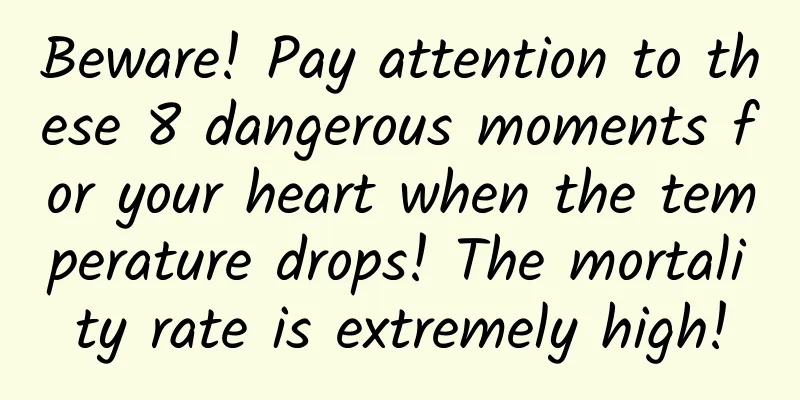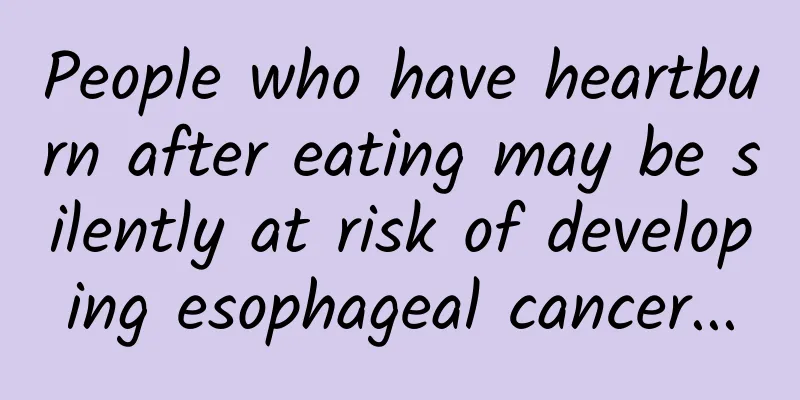Beware! Pay attention to these 8 dangerous moments for your heart when the temperature drops! The mortality rate is extremely high!

|
According to China Weather Network, the first large-scale rain and snow in 2023 is about to hit. It is expected that from January 11 to 15, this strong cold air will bring drastic cooling, strong winds and large-scale rain and snow to our country. The temperature in some areas of Northeast China, Jianghuai, Jiangnan and other places will plummet by about 20°C. There will be obvious rain and snow in North China, Huanghuai and other places, and many places will have the first snow this winter. Copyright image, no permission to reprint As the temperature drops, the heart becomes more vulnerable to damage. 01 There are four hurdles in the heart Xiong Lu, chief physician of the Department of Oncology at Guang'anmen Hospital of China Academy of Chinese Medical Sciences, pointed out in an article published in Health Times in January 2023 that, as the saying goes, the heart hates winter the most. Winter is the most difficult season for heart patients. Therefore, to prevent cardiovascular and cerebrovascular diseases, the heart should be especially careful about the following four health hurdles. The first barrier: Cardiovascular and cerebrovascular diseases are prone to high incidence. In winter, the cold weather is an important reason for the high incidence of cardiovascular and cerebrovascular diseases. The second barrier: large fluctuations in blood pressure. The principle is the same as thermal expansion and cold contraction. In the cold winter climate, blood vessels will also expand with heat and contract with cold. Peripheral vascular contraction will lead to increased blood pressure, which should be given enough attention. The third barrier: blood lipids are prone to increase. In winter, people's outdoor activities are reduced. If they consume more high-fat foods, it is easy to cause obesity. This leads to increased triglyceride and cholesterol levels. The fourth barrier: infection. In winter, the humidity is low and the climate is dry. If the indoor temperature is high and the air circulation is poor, the lips, nose and other parts are prone to lack of moisture, which will leave opportunities for many bacteria to invade and increase the risk of heart infection. Copyright image, no permission to reprint Therefore, if you want your heart to survive the winter, it is recommended to do the following things . First, do not overdo your tonic. Second, avoid strenuous exercise before 10 a.m. Third, keep warm. Catching a cold can easily lead to cardiovascular accidents. It is best to use warm water to wash your face and brush your teeth to reduce blood vessel stimulation; dress warmly when going out, and remember to wear a hat and scarf, etc. 02 Be careful of the 8 dangerous moments of your heart In addition to the drop in temperature, Wang Lixiang, former director of the emergency department of the Third Medical Center of the General Hospital of the People's Liberation Army, published an article in Health Times in 2018 reminding people to pay attention to multiple dangerous moments that can harm the heart. 1. When bathing When bathing, blood vessels throughout the body expand. Elderly people with cardiovascular and cerebrovascular diseases who stay in a closed oxygen-deficient environment for a long time are prone to brain and heart ischemia. Patients with coronary heart disease and middle-aged and elderly people should not bathe when they are full or hungry. The bath water temperature should be equal to body temperature, and the bathing time should not be too long. It is best to do it with the help of others. 2. When using the toilet Many middle-aged and elderly people have difficulty defecating. When they strain to defecate, their intra-abdominal pressure increases and their blood pressure rises rapidly, even doubling compared to usual. This will increase the burden on the heart and induce myocardial infarction. Patients with coronary heart disease and middle-aged and elderly people should avoid using too much force when going to the toilet. When defecation is not smooth, they can use drugs and other methods to assist defecation. Copyright image, no permission to reprint 3. At a party or banquet Many people have the habit of drinking a little wine while dining, but alcohol can excite the brain, increase heart rate, blood pressure, and induce arrhythmia. For people with cardiovascular and cerebrovascular diseases, it can induce coronary artery spasm or acute myocardial infarction. It is recommended that patients with coronary heart disease and middle-aged and elderly people do not drink alcohol, and pay attention to a light diet and do not overeat. 4. When playing chess and cards When the elderly sit still for a long time while playing cards or chess, their blood pressure will soar and their heart rate will increase when they are suddenly excited, which can easily induce myocardial ischemia. It is recommended that patients with coronary heart disease and middle-aged and elderly people should exercise appropriately when playing cards or chess to promote blood circulation in the body, and should not sit still for a long time. 5. When you are used to smoking Smoking can cause arteriosclerosis and increase the risk of myocardial infarction. In addition, smoking can cause coronary artery contraction and spasm, leading to vascular occlusion and myocardial infarction. It is recommended that everyone realize that "smoking is harmful to health" and quit smoking as soon as possible. Believe that it is never too late to quit smoking. Copyright image, no permission to reprint 6. When you wake up in the morning When you get up in the morning, you wake up from a "semi-dormant" state, your breathing and heartbeat speed up, and your blood flow speeds up, which can easily cause aging cardiovascular and cerebrovascular ruptures, and the thick blood can easily form blood clots and cause embolism. This is the "devil's hour" widely recognized by experts. Move your limbs in bed in the morning and then sit up slowly. 7. When watching TV Many elderly people like to watch TV, but watching TV for a long time can make them emotional, cause sympathetic nerve excitement, increase blood pressure, coronary artery spasm, cause myocardial ischemia, and induce angina or myocardial infarction. It is recommended to control the time of watching TV, no more than half an hour before going to bed, and do not watch programs with overly stimulating content. 8. When under high pressure and fatigue Clinically, it has been found that many people who die suddenly have more or less experienced an event of high pressure, prolonged mental tension, and high-intensity work. Copyright image, no permission to reprint A study published in 2020, "Analysis of Epidemiological Characteristics of 5,516 Sudden Death Cases in my country", found that the primary cause of sudden death was sudden cardiac death (57.76%), while emotional excitement (26%) and fatigue (25%) ranked first. Rest when you need to, and don't overload your body. Source: Health Times The cover image and the images in this article are from the copyright library Reproduction of image content is not authorized |
Recommend
Operational Practice: How to operate an e-commerce mini program from 0 to 1?
Entering 2018, the blockchain craze has cooled do...
Where is the real Three-Body World? Will it be the same as described in science fiction novels?
The TV series "The Three-Body Problem" ...
Developers are pleased: Apple Watch software performed well on Christmas
This is a good sign for 2016. What apps do you us...
Talk about the three methods of gaining users through paid social networks
In recent years, various paid communities are sti...
Uncover the iOS apps that only Apple employees can use
Currently, Apple's App Store has nearly 1.3 m...
How can small startups achieve low-cost customer acquisition and viral fission?
This article is generally applicable to small com...
Alipay's "Five Fortunes" collection has started! New family photo, up to 48,888 yuan in prize money
On January 13, the 19th day of the twelfth lunar ...
Whether you choose Android or iOS, you may encounter Microsoft apps
[[127658]] Since launching its cross-platform str...
Tencent has "The Three-Body Problem", iQiyi has "The Storm", but Youku is stuck in the "1 yuan membership"
Since the beginning of the new year, the domestic...
[Issue 16] Random Talk: Scientist from Zhejiang Province - Xu Shoubo: A pioneer throughout his life
...
The sunglasses you wear everyday don’t work when you drive?
In summer, many people go out fully armed and wra...
Five awesome WeChat interactive marketing success cases, have you tried them all?
On January 21, 2015, the fourth birthday of WeCha...
Birds are masters of architecture, and they are also very cunning in their quest for mates.
Excellent architecture is not exclusive to humans...
[High-end boutique] Kuaishou unmanned live broadcast mobile version sold for 588 [live broadcast script + software operation tutorial]
[High-end boutique] Kuaishou unmanned live broadc...
Is 95# oil more resistant to burning than 92# oil? The list of "scientific" rumors in March 2025 is released
This is Beijing Association for Science and Techn...









